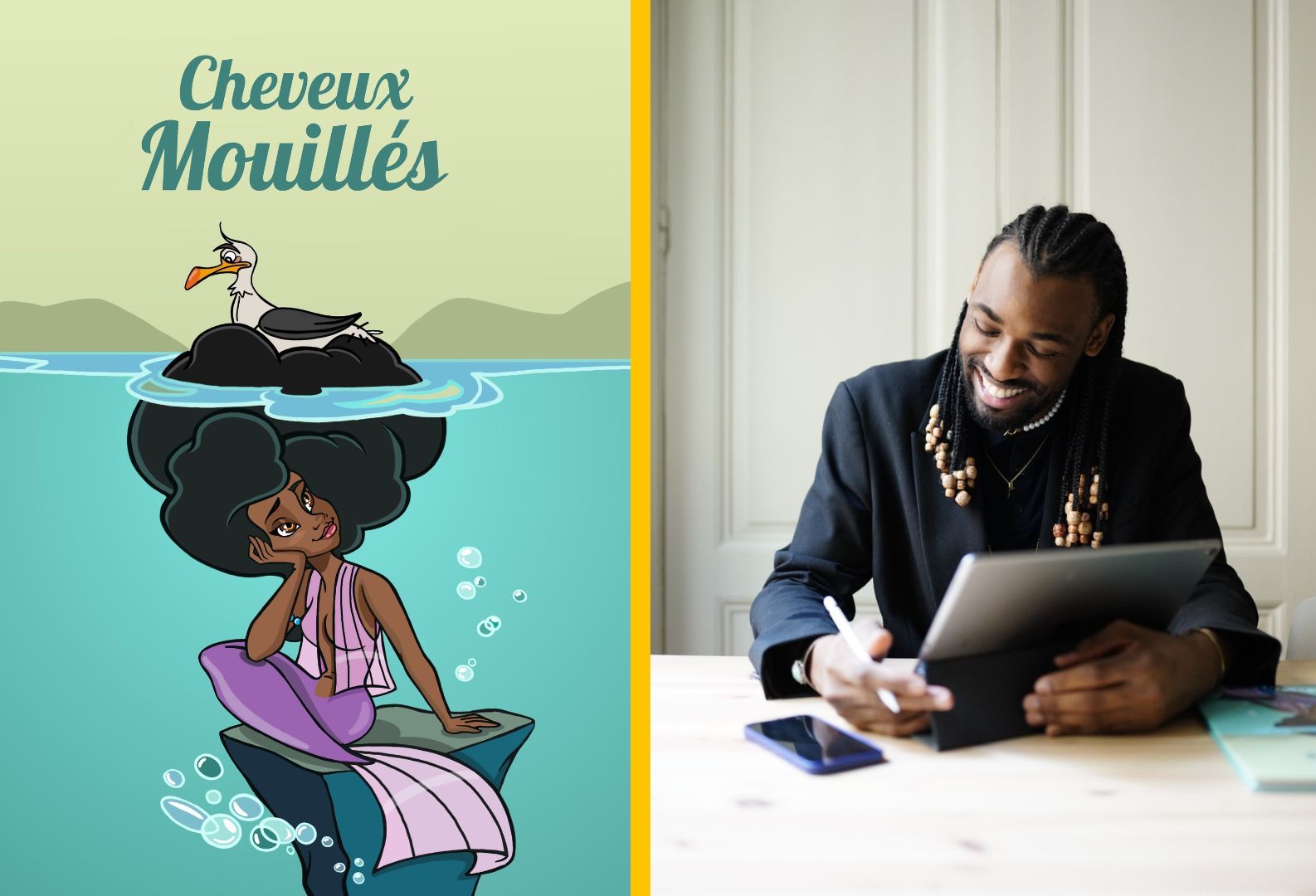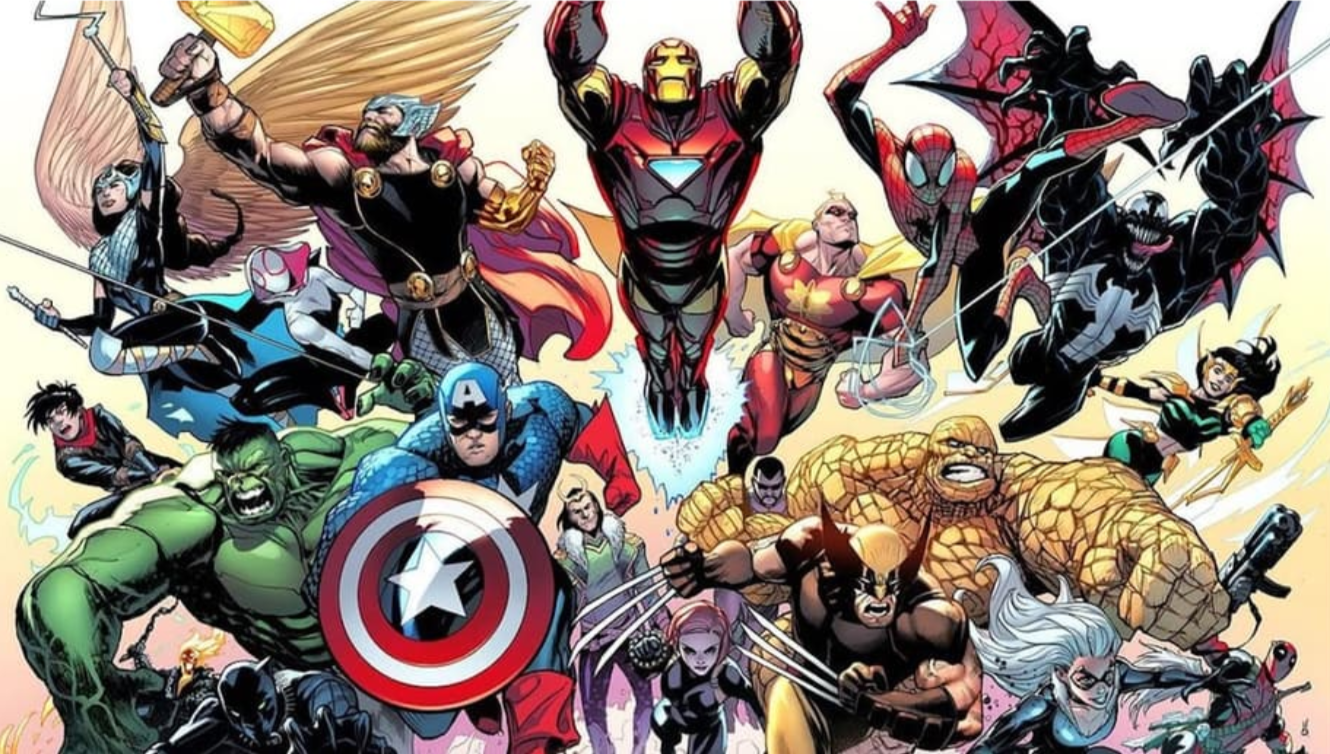Many people hate the type and texture of their hair. For those of color in particular, this can be an additional reason for discrimination and cause significant self-esteem and self-esteem problems. However, more diverse cultural objects can help change mentality from an early age. And for this author-illustrator Joshua Servier decided to add his pencil line to the performance building.
In a children’s book entitled Wet hair self-published and published on August 25, 2022the young Guadeloupe tells the story of a little black mermaid, named Melyka. She who struggles to accept her hair will go through several steps to accept it, in the course of this 64-page book, intended for 5-10 year olds.. We then asked its author a few questions to find out more about this fantastic and yet so human creature, as Disney prepares its remake of The little Mermaid in live-action for May 2023.

Interview with Joshua Servier, author of the children’s book Wet Hair
To miss. Who are you and what was your background before coming to Wet Hair?
I am from Guadeloupe, I am 30 years old, I studied cinema, audiovisual and illustration when I arrived in France in 2012. Due to the sometimes too academic aspect of drawing, I am not disinterested in devoting myself to fashion and I founded my magazine in Lyon , Never on Tuesdays.
With the Black Lives Matter movement, founded in 2013 and revived in May 2020, I wondered what I could do to fight at my level. I had already realized the lack of representation in children’s literature, so I wanted to fill this gap, make an impact.
What impact could it have had on you growing up without feeling represented in traditional culture as a person of color?
I really wanted to create a character who could help forge self-esteem and self-esteem from an early age, and address the issue of hair treatment in the Afro community, long despised, especially for what is shown to us in cartoons, clips, series, cinema, pub …
In order not to be able to physically identify with it, I have always been interested in the construction of characters and plots, and this is what made me want to study drawing and film. On the other hand, today, I realize that if I could have recognized myself earlier on the screen or on the pages of books, things would certainly have been simpler. It could have helped me feel better about myself, with my hair, even younger. And I think that is the case for many other children.
I am fortunate to have parents who instilled in me from an early age the importance of diversity and equality. They were also very honest about the racism I may have encountered growing up. And I think we can never do too much pedagogy on these topics, so we might as well contribute to that.

What relationship do you have with your curly hair?
As a child I had very long hair until the age of 5. They were cut off at that age and I took it very badly. As soon as I had the opportunity to regrow them, I took it with great care.
My representations were not in what I read or saw on the screen, but around me: my mother has beautiful and very well-groomed frizzy hair, my brother too, so I have always had a positive relationship with my hair, their nature and their consistency. I benefited from a real capillary education. I never wanted to straighten my hair, for example.
Why did you choose the design to remedy this lack of representation?
I have a very cartoonish drawing style, which speaks more to children. We can tell stories to children and convey beautiful values in a much easier way than adults. And the sooner we address these issues, the better we can change attitudes.

How was your mermaid character, Mélyka, the heroine of your Wet Hair children’s book, born?
I don’t know where my love for mermaids came from, but I found drawings of these amazing creatures that I have been making since the age of 4! A sign that it has always fascinated me. I know it is also part of the tales and legends of the West Indies. I grew up on an island so I have a fascination for water, its fauna and flora, but also the mythologies of the world that have to do with the sea.And clearly, my favorite film is La Petite Mermaid, and I’m very proud of it!
Mélyka is the first name of a cousin of mine who encountered problems similar to those of my siren. Following a tease, she, wearing a superb afro, straightened her hair. I know that many girls, but also boys, have to deal with this type of hair discrimination, which can go much further, especially at work. We have completely trivialized, even naturalized, the prejudice that the more curly we are, the less disciplined we are. And this can be increased tenfold by colorism.
Did you offer your book to publishing houses before choosing self-publishing?
I turned to more than 40 publishing houses, I got 26 negative responses when the others were content not to answer me. Those who took the time and care to explain why and how they rejected my project was because they found my line too much cardboard, Disney, and fashion was more natural, especially watercolor. Almost two years have passed between the time I finished writing and sketching my story and the time I started my presale campaign. I had to release this project at all costs.

What can we expect for the continuation of Mélyka’s adventures: a book continuation, even in cartoon?
This is the question everyone asks me! You should know that I draw everything by hand, on paper, before scanning and coloring and inking with a graphics tablet. That’s a lot of work that would be even more colossal for a cartoon!
For the promotion of the book Wet hair, I made a 16 second cartoon video and it took me a month and a half. So, in terms of means and budget, it would be colossal and unthinkable on its own. A studio should come close to me.
For future numbers, it depends on the reception of the public, but it looks like it started off well! But now I need to take a break with this Mélyka character who has been living with me for 3 years (and who I still love today, of course), for the time being.
What are your future projects then?
With an influencer friend, @CeQueCheveux, we are working on a graphic novel about historical black female personalities around the world, but I can’t say more about it. Solo, I’m also preparing a graphic novel about the love story between King Solomon and the Queen of Sheba, intended for 10-15 year olds, where Wet hair it is aimed more at children of 5-10 years.

A photo credit: Wet hairby Joshua Servier
Source: Madmoizelle
Lloyd Grunewald is an author at “The Fashion Vibes”. He is a talented writer who focuses on bringing the latest entertainment-related news to his readers. With a deep understanding of the entertainment industry and a passion for writing, Lloyd delivers engaging articles that keep his readers informed and entertained.




.png)